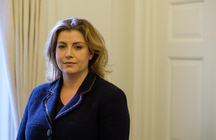Below is the text of the speech made by Penny Mordaunt, the Secretary of State for International Development, on 6 March 2018.
I’m delighted to welcome you here today and in particular to His Excellency, Mr Gamal Hassan, the Minister of Planning, Investment and Economic Development of the Federal Republic of Somalia today and our other distinguished guests. I’d also like to thank Mark Lowcock for initiating this meeting, and for all the work his team has done with my officials to bring us all together today.
I am proud of the UK’s partnership with Somalia. This time last year, Somalia was on the brink of disaster and we realised that we had to step up. Together we have averted a famine and saved thousands of lives.
Last year’s response was an important success story, both for Somalia and for the international humanitarian system. But the job is not finished yet. The humanitarian situation remains a major cause for concern, and the famine risk remains high.
We need to sustain and build on our humanitarian response to ensure that we meet the most immediate and urgent needs. Alongside this, we also need to recognise the need for long-lasting solutions to break the cycle of this crisis. That is why we have called this meeting today.
My Department, and the UK Government, remain committed to working with the Somali authorities, local and international NGOs, UN agencies, and new partners who can help us reach the 5.4 million people in need of humanitarian assistance after some of the worst droughts on record.
In January I visited Mogadishu and saw first-hand the lifesaving work we are doing together, and I also announced £21 million in UK funding towards the 2018 humanitarian response.
Today, I’m pleased to confirm a further commitment, bringing our total contribution to £86 million. This includes £24.6 million from the UK Crisis Reserve, which helps us respond to emergency situations. I’m pleased to confirm that £46 million of this will be released before the end of this month, to ensure that funds are available to support early action and intervention. And I would like to thank all of you for your continued support to Somalia and encourage you to step up to the challenge in 2018 as we try and avert a potential famine.
I hope that this meeting will serve to encourage all of us to sustain our efforts to continue to tackle the drought, and ensure that the famine we helped to prevent last year does not happen again instead, to ensure that funds are available to support early action and intervention. I would like to thank everyone for your continued support.
I know that the spring rains will be critical in determining how severe the situation becomes this year. But even if the rains are good, humanitarian needs will still remain high. That is why I have asked my officials to keep me updated. As the year unfolds we will consider if additional UK resources are required.
As we join together to meet the challenges ahead, we must also ensure that we deliver against the Grand Bargain commitments that we all signed up to.
We must do better at including the most marginalised Somalis and ensuring that we protect the most vulnerable – women and girls and disabled people in particular. This means ensuring that aid is able to reach conflict-affected areas. And I call on the Somali authorities, and international partners, to do all they can to ensure that access for humanitarian aid is not restricted.
And we must also look forward and beyond the current situation. Drought need not turn into widespread food insecurity and famine. It is vitally important that we balance both the short and long term needs of vulnerable Somalis, and make sure there are stronger links between our humanitarian and development work so we can build resilience and the ability to cope with future shocks. As Somalia’s government makes progress in addressing insecurity, rebuilding its institutions, and creating economic opportunities for its citizens, we will be better placed to break this persistent cycle of crisis.
And having recently visited, I am optimistic about the future.
Long term solutions require stability and a real commitment from Somalia itself. We have seen that we can work together to stave off disaster. We are also seeing growing evidence that Somalia is heading towards a future where it can better take care of its own needs, including making good progress on its re-engagement with the IMF and the development banks and raising its own revenue.
This is why the UK government will continue to play an active role in supporting Somalia to meet all these objectives, including helping develop new ideas for economic recovery and continuing the progress being made towards re-engagement with the international financial system.
I wish you a very fruitful meeting today and I thank you again for your continued commitment to Somalia.
